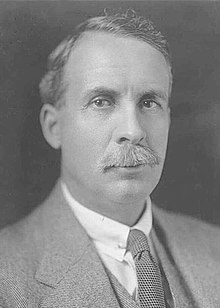George Pearce
Sir George Foster Pearce KCVO (born January 14, 1870 in Mount Barker , South Australia , † June 24, 1952 in Melbourne , Victoria ) was an Australian politician and, among other things, foreign minister of the country.
Early life
Pearce, a carpet maker, was born in Mount Barker, South Australia and attended Red Hill Public School in high school until he was eleven years old. He kept working on farms and later became a carpet maker in Adelaide , but lost his job there during the economic depression in 1891 and moved to Western Australia . There he joined the Amalgamated Society of Carpenters and Joiners and quickly became involved in the union movement. In April 1897 he married Eliza Maud Barrett.
Political career
In 1893, Pearce helped found the Progressive Political League , a predecessor of the ALP. After training himself in politics and economics, he was elected as a senator to the Australian Parliament for Western Australia in the first federal elections in 1901. He did not belong to the first Labor Cabinet under Prime Minister Chris Watson in 1904. In 1908 he became Secretary of Defense in the government of Andrew Fisher . He oversaw the establishment of the Marine College at Jervis Bay and the Royal Military College Duntroon . In 1914, Australia entered the First World War one. Following Billy Hughes ' rise to prime minister, Pearce was named vice chairman of the Labor Party.
During this time, after the introduction of conscription in Australia , voices grew louder and, contrary to the opinion of the majority of his party colleagues, Pearce was in favor of it. Like numerous other founding members of the party, Pearce followed the Premier Hughes in his newly formed National Labor Party (later the Nationalist Party of Australia ).
Many of the breakaway lab members barely played a role in the years that followed, but Pearce successfully continued his career. After Hughes' replacement in the Nationalist Party of Australia , Pearce also took over as minister under Stanley Bruce . In 1932 Pearce joined the newly formed United Australia Party , where he held a ministerial post under Joseph Lyons until the election defeat . At the time, he was the last senator to have been elected in Australia's first federal election in 1901. He served a total of 37 years and three months as a senator, which is a record. He served as minister for a total of 24 years and seven months, which is another record. Among other things, he was the country's foreign minister .
Pearce died at home in Elwood, a suburb of Melbourne. He left two sons and two daughters.
particularities
George Pearce was made a Knight of the Royal Victorian Order . The RAAF Base Pearce is named after him, as is the suburb of Canberra , Pearce. Pearce is also the namesake for Pearce Peak , a mountain in Antarctica.
literature
- B. Beddie: George Pearce . In: Douglas Pike (Ed.): Australian Dictionary of Biography . Melbourne University Press, Carlton (Victoria) 1966–2012 (English).
- John Connor: Anzac and Empire: George Foster Pearce and the Foundations of Australian Defense. Cambridge University Press, Cambridge 2011, ISBN 978-1-107-00950-9 .
| personal data | |
|---|---|
| SURNAME | Pearce, George |
| ALTERNATIVE NAMES | Pearce, Sir George Foster (full name) |
| BRIEF DESCRIPTION | Australian politician |
| DATE OF BIRTH | January 14, 1870 |
| PLACE OF BIRTH | Mount Barker , South Australia, Australia |
| DATE OF DEATH | June 24, 1952 |
| Place of death | Melbourne |

